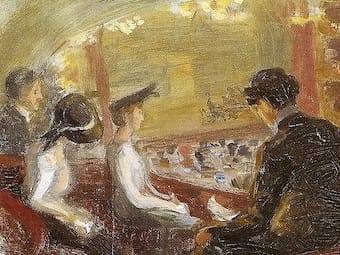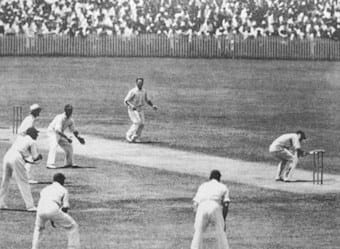865
John Buchan draws a distinction between political changes brought by violence and those brought by progress.
John Buchan’s historical research and long experience in Government led him to believe that revolutions achieved little. Political betterment, he argued, comes not from violent overthrow by small, ideologically-driven groups of activists but from the natural wasting away of repression owing to popular dislike.
Posted May 24 2018
866
When violinist Joseph Joachim proposed a toast to the world’s greatest composer, he was cut off in mid flow.
German composer Johannes Brahms was well-known for his mercurial attitude to praise. Up to a point he accepted it happily enough, but if ever it became oppressive he would do almost anything to escape it. Charles Villiers Stanford, professor of music at the Royal College of Music and at Cambridge University, was present on one of these occasions.
Posted May 23 2018
867
Composer Johannes Brahms disliked the adulation sometimes heaped on him by fans, and found quite imaginative ways to avoid it.
Composer Johannes Brahms liked his music to be appreciated, but if the eulogies became cloying his manner would undergo a marked change. His friend Charles Villiers Stanford tells us about one occasion when Brahms used all his ingenuity to escape a too-flattering fan.
Posted May 21 2018
868
Sir Charles Villiers Stanford recalls the very different receptions given by British and German audiences to a little bit of Brahms.
Britain’s position outside the European Continent, politically and physically, has in no way lessened her appetite for European culture. Indeed at the very height of Empire, so Sir Charles Stanford tells us, a little critical distance gave the British an appreciation (and a common courtesy, one might add) that the Continentals lacked.
Posted May 21 2018
869
As soon the Roman Emperor Constantine declared religious liberty in his Empire, the Christian Church gave him cause for regret.
In 312, Constantine confirmed his election as Roman Emperor in battle, fighting under the banner of the Cross. Among his first acts as Emperor was to declare religious liberty across the Roman world, but almost immediately a learned priest from Alexandria in Egypt named Arius threw everything into chaos.
Posted May 20 2018
870
Douglas Jardine came up with a plan to deprive the watching public of one of the finest sights in all sport.
The ‘Bodyline’ Test series between Australia and England in 1932-33 remains one of the most controversial moments in cricketing history. It all stemmed from the almost freakish genius of Don Bradman, who to this day remains far and away the best batsman the game has ever seen, but England captain Douglas Jardine was determined to see as little of him as possible.
Posted May 12 2018





